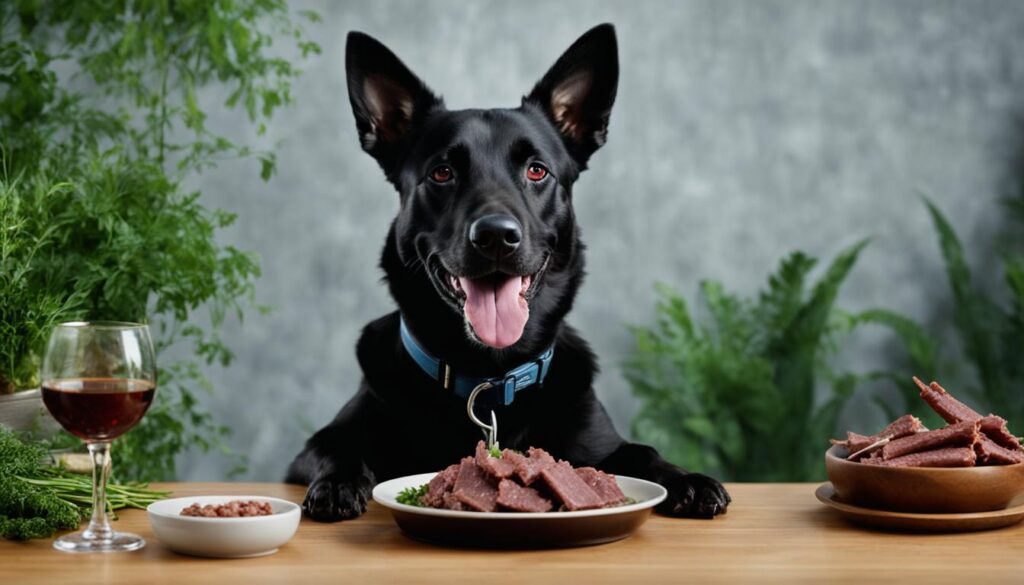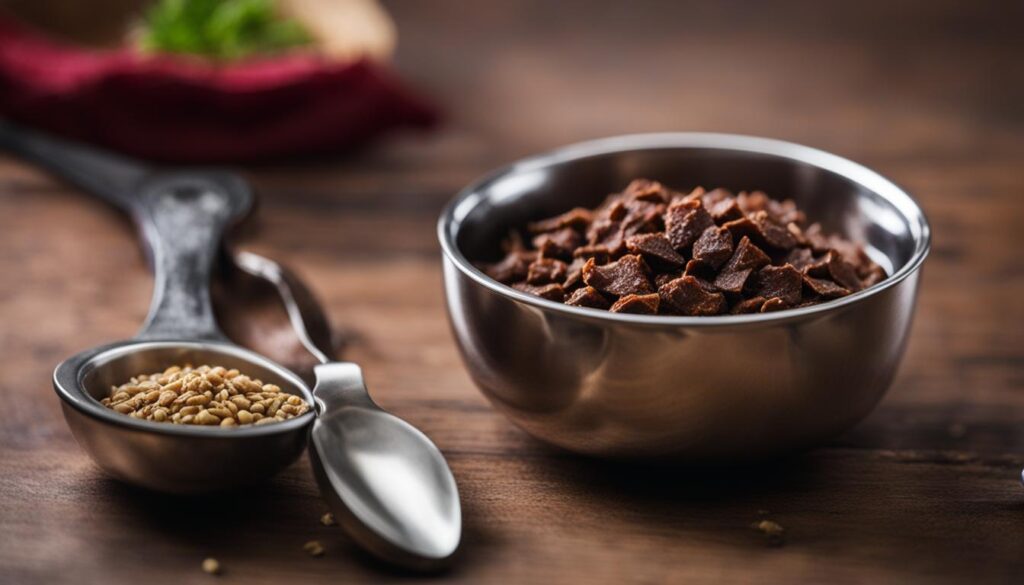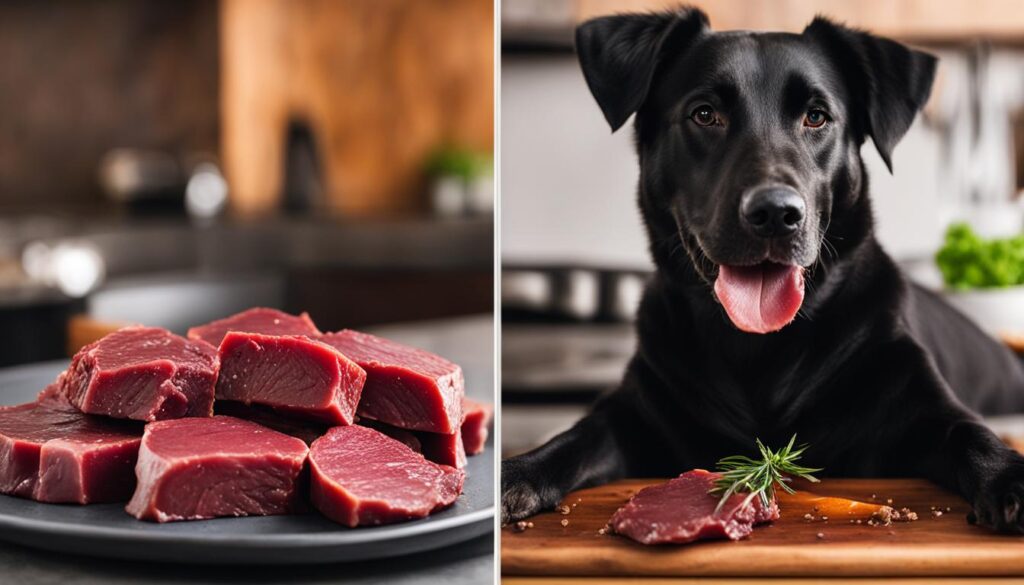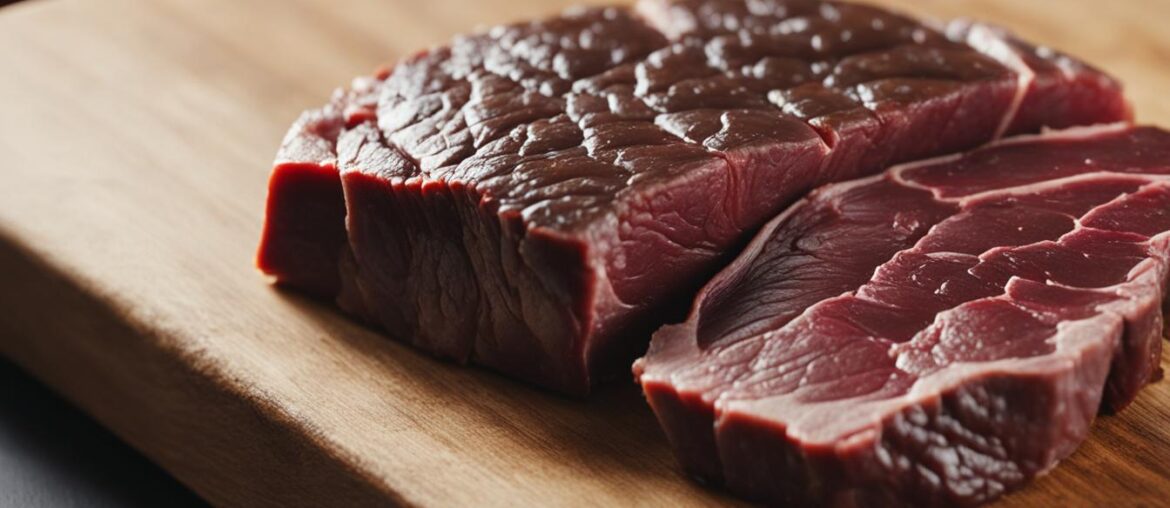Liver is a highly nutritious food that can provide numerous benefits for dogs. As a responsible pet owner, it’s important to understand the role of liver in a dog’s diet, the nutritional benefits it offers, and how to safely incorporate it into their meals. In this article, I will explore the question of whether dogs can eat liver, its potential benefits, and any risks to be aware of.
Feeding liver to dogs is a topic that often sparks curiosity and concern among pet owners. Some wonder if it’s safe to give their furry companions liver as a treat, while others are curious about the role of liver in canine nutrition. Understanding the facts about feeding liver to your dog can help you make informed decisions about their diet and overall well-being.
When it comes to the nutritional benefits of liver for dogs, there are several key points to consider. Liver is not only a rich source of essential vitamins and minerals, but it also contains high-quality proteins that can support your dog’s overall health. It is packed with nutrients such as vitamin A, vitamin B, iron, zinc, and omega-3 fatty acids. These nutrients are vital for various bodily functions, including immune support, digestion, and the maintenance of healthy skin and coat.
While liver offers many benefits, it’s essential to understand the proper amount to feed your dog and how to prepare it correctly. Feeding too much liver or not preparing it properly can lead to potential health risks. In the following sections, I will delve deeper into the topic, providing you with the necessary information to make educated decisions about including liver in your dog’s diet.
Key Takeaways:
- Liver is a nutritious addition to a dog’s diet, providing essential vitamins, minerals, and proteins.
- It contains vital nutrients such as vitamin A, vitamin B, iron, zinc, and omega-3 fatty acids.
- Feeding liver to your dog in moderation can support immune health, digestion, and a healthy skin and coat.
- It’s crucial to understand the proper amount of liver to feed your dog and how to prepare it safely.
- Consulting with a veterinarian is recommended to ensure the optimal balance of liver in your dog’s diet.
Is Beef Liver Good for Dogs?

When it comes to the nutritional needs of dogs, beef liver holds numerous benefits. Packed with essential nutrients, beef liver can contribute to the overall health and well-being of our canine companions.
Beef liver is a rich source of iron, which plays a vital role in carrying oxygen throughout the body. Additionally, it contains vitamins A, B, and D, folic acid, phosphorus, essential fatty acids, zinc, and copper. These nutrients support various aspects of a dog’s health, from digestion and immune system function to the well-being of reproductive organs and bone, joint, nerve, and mental health.
Feeding beef liver to dogs can help optimize their diet with necessary vitamins and minerals. The inclusion of liver can enhance their overall nutritional intake and contribute positively to their overall health and quality of life.
| Nutrients | Benefits |
|---|---|
| Iron | Essential for oxygen transport and red blood cell production |
| Vitamins A, B, D | Supports various bodily functions, including immune system health and bone development |
| Folic Acid | Crucial for cell growth and reproduction |
| Phosphorus | Contributes to healthy bone formation and function |
| Essential Fatty Acids | Supports a healthy coat, skin, and overall immune system |
| Zinc and Copper | Helps maintain a healthy metabolism and supports enzyme function |
By incorporating beef liver into their diet, dog owners can help provide a diverse range of essential nutrients that contribute to their pet’s overall health and vitality.
Quote:
“Beef liver is a valuable addition to a dog’s diet due to its rich nutrient profile. It can provide essential vitamins, minerals, and fatty acids that support various aspects of a dog’s health, from immune system function to bone and joint health.” – Dr. Smith, Veterinarian
However, it is important to note that while beef liver offers numerous nutritional benefits, moderation is key. Feeding too much liver can lead to an imbalance in certain nutrients, such as excessive iron intake or copper toxicity in susceptible breeds.
As with any dietary change or addition, it is advisable to consult with a veterinarian to ensure the appropriate amount of beef liver for your dog’s specific nutritional needs. They can provide personalized guidance and recommendations based on your dog’s overall diet and health status.
Feeding beef liver to dogs can be a wholesome and nutritious choice, providing a range of essential nutrients that contribute to their overall well-being. Remember to introduce liver gradually, monitor your dog’s response, and consult with a veterinarian to ensure the optimal balance in their diet.
Source of Omega 3 and Omega 6 Fatty Acids
Liver is a rich source of omega 3 and omega 6 fatty acids, which play a crucial role in supporting a dog’s immune system and maintaining healthy skin. These essential fatty acids cannot be produced by the dog’s body and must be obtained through their diet. Fortunately, liver provides a natural and nutritious source of these beneficial fats.
Omega 3 fatty acids, such as eicosapentaenoic acid (EPA) and docosahexaenoic acid (DHA), have anti-inflammatory properties and can help enhance the dog’s immune response. They support the proper functioning of the immune system, reducing the risk of infections and promoting overall health.
Omega 6 fatty acids, such as linoleic acid, contribute to the health of a dog’s skin and coat. These fatty acids play a vital role in maintaining the integrity of the skin barrier and promoting a shiny and lustrous coat. They help prevent dryness, flakiness, and itchiness, ensuring that your dog’s skin remains healthy and comfortable.
| Benefits of Omega 3 and Omega 6 Fatty Acids from Liver |
|---|
| Enhances the dog’s immune response |
| Supports a healthy skin barrier |
| Promotes a shiny and lustrous coat |
Feeding liver to your dog can provide them with the necessary omega 3 and omega 6 fatty acids to support their immune system and maintain optimal skin health. However, it is important to consider the overall balance of your dog’s diet and consult with a veterinarian to ensure the appropriate amount of liver for your dog’s specific needs.
Energy Boosting Properties of Liver

Liver is a protein-rich food that can significantly boost a dog’s energy levels. This organ meat contains essential nutrients that contribute to enhanced vitality and overall well-being.
One key nutrient found in liver is vitamin B12, which plays a crucial role in energy production. This vitamin helps convert the food dogs eat into usable energy, ensuring that their bodies have the fuel needed to stay active and engaged.
Moreover, liver is renowned for its relatively low fat content compared to muscle meat. This makes it an ideal pre-exercise snack for dogs, as it provides an energy boost without weighing them down. Whether your furry friend is about to embark on a vigorous hike or engage in an intense play session, offering liver as a snack can help optimize their performance.
To harness the energy-boosting benefits of liver, it is essential to incorporate it into your dog’s diet appropriately. Balancing their overall protein intake and consulting with a veterinarian can help ensure that liver is integrated in a way that maximizes its benefits.
Key Points:
- Liver is a protein-rich food that can boost a dog’s energy levels.
- Vitamin B12 found in liver plays a crucial role in energy production.
- The low fat content of liver makes it a suitable pre-exercise snack for dogs.
- Consulting with a veterinarian can help ensure proper integration of liver into your dog’s diet.
Risks of Overfeeding Beef Liver to Dogs

While beef liver can be a nutritious addition to your dog’s diet, it’s important to be aware of the potential risks of overfeeding. Here are some risks that you should consider:
- Copper Toxicity: Beef liver contains high levels of copper, which can be toxic to dogs, especially certain breeds that are prone to copper storage disease. Overfeeding liver can lead to a buildup of copper in the dog’s system, causing liver damage and other health issues.
- Hypervitaminosis A: Beef liver is rich in vitamin A, which is important for a dog’s health. However, excessive intake of vitamin A can lead to hypervitaminosis A, a condition that can cause bone and joint problems, as well as other symptoms like lethargy and loss of appetite.
- Excessive Iron Intake: Beef liver is also high in iron, which is essential for dogs. However, too much iron can be harmful and lead to iron toxicity. This can cause digestive upset, organ damage, and other serious health issues if not properly managed.
- Loose Stools: Feeding too much liver to your dog can result in loose stools or diarrhea. This can be attributed to the liver’s high protein and fat content, which may be difficult for some dogs to digest in large quantities.
- High Phosphorus Content: Beef liver is rich in phosphorus, which may not be suitable for dogs with kidney conditions. Excess phosphorus can put strain on the kidneys and worsen existing kidney problems.
To prevent these risks, it is crucial to feed beef liver to your dog in moderation and consult with your veterinarian. They can provide guidance on the appropriate amount of liver to include in your dog’s diet based on their specific needs and health conditions.
| Risks of Overfeeding Beef Liver to Dogs | Prevention |
|---|---|
| Copper Toxicity | Feed beef liver in moderation, especially in susceptible dog breeds. Consult with a veterinarian for proper dosage. |
| Hypervitaminosis A | Avoid excessive intake of vitamin A from beef liver. Follow veterinarian recommendations. |
| Excessive Iron Intake | Monitor iron intake and ensure it is within the recommended limits. Regularly check iron levels if necessary. |
| Loose Stools | Feed liver in appropriate portions to avoid gastrointestinal upset. If loose stools occur, decrease liver intake. |
| High Phosphorus Content | Consider phosphorus levels in the overall diet, especially for dogs with kidney conditions. Adjust liver intake accordingly. |
Recommended Amount of Liver for Dogs

The amount of liver that can be fed to dogs depends on their overall diet and the inclusion of other organ meats. As a general guideline, liver should make up about 5-10% of a dog’s diet by weight. It is important to consider the size and weight of the dog when determining the optimal liver dosage.
When introducing liver as a supplement in a dog’s diet, it is recommended to start with small amounts and gradually increase the serving size. This allows the dog’s digestive system to adjust to the new addition. Monitoring the dog’s response and overall health is important during this process.
It is also essential to consider the nutritional balance of the dog’s overall diet. Liver should be incorporated as part of a well-rounded meal plan that includes other sources of protein, carbohydrates, fruits, and vegetables to ensure complete and balanced nutrition.
Feeding too much liver can lead to imbalances in certain nutrients and potentially cause adverse health effects. Therefore, it is crucial to consult with a veterinarian or a canine nutritionist to determine the appropriate liver dosage for your dog’s specific needs.
Remember, moderation is key when it comes to supplementing a dog’s diet with liver. While liver can provide valuable nutrients, it should not be the sole focus of their diet. A varied and balanced diet is essential to support their overall health and well-being.
How to Cook Beef Liver for Dogs

Cooking beef liver for dogs is a simple process that can provide a nutritious and delicious treat for your furry friend. Follow these steps to prepare beef liver for your dog:
- Remove the packaging from the beef liver.
- Rinse the liver under running water to remove any impurities.
- In a pot, add enough water to cover the liver. Bring the water to a boil.
- Once the water is boiling, reduce the heat to a simmer and add the liver.
- Cover the pot and let the liver simmer for about 15 minutes or until it is tender.
- Remove the liver from the pot and let it cool.
- Once the liver is cool, dice it into bite-sized pieces that are appropriate for your dog’s size.
- Serve the cooked beef liver to your dog as a tasty and nutritious treat.
It’s important to note that you should avoid adding any seasonings, spices, or additives to the liver when cooking it for your dog. Dogs have sensitive dietary needs, and certain ingredients, such as onion and garlic, can be toxic to them. Keeping the liver plain and free from added ingredients ensures that it remains safe and healthy for your furry companion.
Note: Always consult with your veterinarian before making any changes to your dog’s diet or introducing new foods, including liver.
| Benefits of Cooking Beef Liver for Dogs |
|---|
| Nutrient-rich: Beef liver is packed with essential vitamins and minerals that contribute to your dog’s overall health. |
| Improved digestion: Liver contains nutrients that support a healthy digestive system in dogs. |
| Strong immune system: The vitamins and minerals in beef liver can help boost your dog’s immune response. |
| Healthy coat and skin: The nutrients in liver promote a shiny coat and healthy skin in dogs. |
Cooked vs. Raw Beef Liver for Dogs

Both raw and cooked beef liver can be suitable for dogs. Raw liver may contain more nutrients, as cooking can lead to the loss of certain vitamins and minerals. However, it’s important to consider the benefits and safety concerns associated with each option.
Benefits of Feeding Raw Liver to Dogs
Raw liver is often touted as a more nutrient-dense option for dogs. When liver is cooked, some heat-sensitive vitamins, such as vitamin C and B vitamins, may be lost. Feeding raw liver can provide dogs with essential nutrients, including iron, vitamins A, D, and B, and folic acid. These nutrients support various aspects of a dog’s health, such as immune function, bone health, and digestion.
Feeding raw liver to dogs can provide them with essential nutrients and support their overall health and well-being.
Safety Concerns of Raw Liver for Dogs
While raw liver can offer nutritional benefits, it also carries potential risks. Raw meat, including liver, may contain bacteria or parasites that can cause illness in dogs. To minimize the risk of infection, it’s crucial to source high-quality, human-grade liver from reputable sources. Freezing raw liver for at least two weeks before feeding it to dogs can help further reduce the chance of bacterial or parasitic infections.
Consulting with a veterinarian is essential before incorporating raw liver into your dog’s diet. They can provide guidance on sourcing and preparation, as well as assess your dog’s specific dietary needs and any potential health risks.
The case for Cooked Liver
Cooked beef liver can also provide valuable nutrients for dogs. While cooking may lead to the loss of some heat-sensitive vitamins, it can also help eliminate bacteria and parasites that may be present in raw liver, thus reducing the risk of infection. Cooking the liver can also make it easier for dogs to digest, especially for those with sensitive stomachs.
Beef Liver for Dogs with Anemia
Beef liver can be a beneficial addition to the diet of dogs with anemia. Anemia is a condition characterized by a low red blood cell count or a decrease in hemoglobin levels, which can lead to fatigue, weakness, and other health issues. The high iron content in beef liver makes it an excellent choice for helping dogs with anemia replenish their iron levels and support red blood cell production.
Iron is an essential mineral for the formation of hemoglobin, the protein responsible for carrying oxygen to the body’s tissues. By incorporating beef liver into a dog’s diet, we can provide them with a natural source of iron, assisting in the production of healthy red blood cells and helping to improve their overall health and energy levels.
The recommended amount of cooked beef liver for dogs with anemia may vary based on their size and overall nutritional needs. It is essential to consult with a veterinarian to determine the appropriate dosage and ensure that it aligns with the specific requirements of your dog.
Feeding beef liver to dogs with anemia can provide the following benefits:
- Replenishes iron levels in the bloodstream
- Aids in red blood cell production
- Improves energy levels and reduces fatigue
- Supports overall health and well-being
Remember, while beef liver can be a valuable addition to a dog’s diet, it should be fed in moderation and as part of a balanced meal plan. If you suspect that your dog may have anemia, it is essential to seek veterinary advice for a proper diagnosis and treatment plan. A veterinarian can provide guidance on incorporating beef liver safely into your dog’s diet to optimize their health and well-being.
| Iron | Amount (mg) |
|---|---|
| Total Iron | 5.8 mg |
| Heme Iron | 2.3 mg |
Beef Liver for Dogs with Cancer
When it comes to dogs with cancer, beef liver can offer valuable benefits. This nutrient-rich organ meat is packed with essential nutrients such as iron, B vitamins, and omega-3 fatty acids. These nutrients play a crucial role in supporting overall health and may have the potential to help reduce tumor growth.
The iron found in beef liver is particularly important for dogs with cancer, as it aids in the production of red blood cells, which carry oxygen throughout the body. B vitamins, including B12, support healthy cell function and play a vital role in a dog’s immune system. Omega-3 fatty acids have anti-inflammatory properties and can help promote optimal cellular health.
It is essential to ensure that the beef liver is thoroughly cooked before feeding it to dogs with cancer. Cooking the liver eliminates any risk of infection, which is especially important for dogs with compromised immune systems. By taking this precaution, you can provide your furry friend with the valuable nutrients found in beef liver while minimizing any potential health risks.
While beef liver can offer nutritional benefits for dogs with cancer, it is crucial to consult with a veterinarian before making any dietary changes. They can provide guidance on the appropriate amount of beef liver to include in your dog’s diet and help ensure a balanced and healthy eating plan.
| Nutrient | Function | Sources |
|---|---|---|
| Iron | Supports red blood cell production and oxygen transport | Beef liver, other organ meats |
| B Vitamins | Supports healthy cell function and immune system | Beef liver, other organ meats |
| Omega-3 Fatty Acids | Anti-inflammatory properties, promotes cellular health | Beef liver, other fatty fish |
Wrapping Up
Liver can be a nutritious addition to a dog’s diet, offering various benefits such as essential vitamins, minerals, and proteins. It is rich in iron, vitamins A, B, and D, folic acid, phosphorus, essential fatty acids, zinc, and copper, which support different aspects of a dog’s health. The inclusion of liver in a dog’s diet can contribute to their digestion, immune system, reproductive organs, and bone, joint, nerve, and mental health.
However, it is important to feed liver to dogs in moderation. Overfeeding beef liver can lead to risks such as copper toxicity in susceptible breeds, hypervitaminosis A, excessive iron intake, loose stools, and high phosphorus levels that may be detrimental to dogs with kidney conditions. It is crucial to consult with a veterinarian to determine the appropriate dosage of liver and overall balance in a dog’s diet.
When preparing beef liver for dogs, it is recommended to cook it by simmering in water until tender. Avoid adding seasonings or additives. Both raw and cooked liver can be suitable for dogs, but raw liver carries a risk of bacterial and parasitic infections. It is important to source high-quality, human-grade liver and freeze it for at least two weeks before feeding it to dogs.
Feeding liver to dogs can provide them with important nutrients and boost their overall health. However, it is essential to consider any underlying health conditions and consult with a veterinarian to ensure the optimal benefit and safety of liver consumption for dogs.
FAQ
Can dogs eat liver?
Yes, dogs can eat liver. In fact, liver is a nutritious addition to a dog’s diet, providing various benefits.
What are the nutritional benefits of feeding liver to dogs?
Liver is rich in iron, vitamins A, B, and D, folic acid, phosphorus, essential fatty acids, zinc, and copper. These nutrients support various aspects of a dog’s health, including digestion, immune system, reproductive organs, and bone, joint, nerve, and mental health.
Is beef liver good for dogs?
Yes, beef liver is a nutritious option for dogs. It is rich in essential nutrients and can be beneficial for their overall health.
Is liver a source of omega-3 and omega-6 fatty acids?
Yes, liver is a source of omega-3 and omega-6 fatty acids, which are beneficial for a dog’s immune system and skin health. These fatty acids can improve the dog’s immune response and contribute to a shiny and healthy coat.
Does liver boost a dog’s energy?
Yes, liver is a protein-rich food that can help boost a dog’s energy. It contains vitamin B12, which is involved in energy production. Additionally, liver has less fat than muscle meat, making it a suitable snack before activities such as hikes or jogs.
Are there any risks of overfeeding beef liver to dogs?
Yes, overfeeding beef liver to dogs can lead to various risks, including copper toxicity in susceptible breeds, hypervitaminosis A, excessive iron intake, loose stools, and high phosphorus content that may be detrimental to dogs with kidney conditions. It is important to feed liver in moderation and consult with a veterinarian.
How much liver can dogs eat?
The amount of liver that can be fed to dogs depends on their overall diet and the inclusion of other organ meats. As a general guideline, liver should make up about 5-10% of a dog’s diet by weight. It is recommended to start with small amounts and gradually increase serving size.
How do I cook beef liver for dogs?
Cooking beef liver for dogs is a simple process. It is important to remove packaging, rinse the liver to remove impurities, simmer it in water for about 15 minutes until tender, and then dice it into bite-sized pieces before serving. It is recommended to avoid seasonings and additives.
Can dogs eat raw liver?
Both raw and cooked beef liver can be suitable for dogs. Raw liver may contain more nutrients, as cooking can lead to the loss of certain vitamins and minerals. However, raw liver also carries a risk of bacterial and parasitic infections. It is important to source high-quality, human-grade liver and freeze it for at least two weeks before feeding it to dogs.
Is beef liver beneficial for dogs with anemia?
Yes, beef liver can be beneficial for dogs with anemia due to its high iron content. Iron is essential for red blood cell production and can help replenish iron levels in the bloodstream. The recommended amount of cooked beef liver for dogs with anemia varies based on their size.
Can beef liver be beneficial for dogs with cancer?
Yes, beef liver can provide important nutrients for dogs with cancer, such as iron, B vitamins, and omega-3 fatty acids. These nutrients can support overall health and potentially help reduce tumor growth. It is important to ensure that the liver is thoroughly cooked to eliminate any risk of infection, especially for dogs with compromised immune systems.
Can liver be a nutritious addition to a dog’s diet?
Yes, liver can be a nutritious addition to a dog’s diet, offering various benefits such as essential vitamins, minerals, and proteins. However, it is important to feed liver in moderation and consider any underlying health conditions. Consulting with a veterinarian is recommended to ensure the appropriate dosage and overall balance in a dog’s diet.






